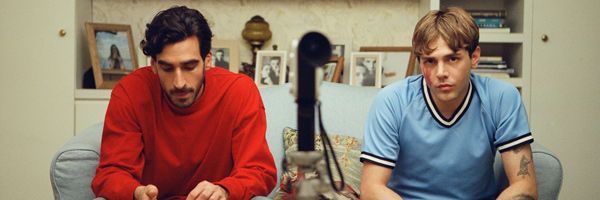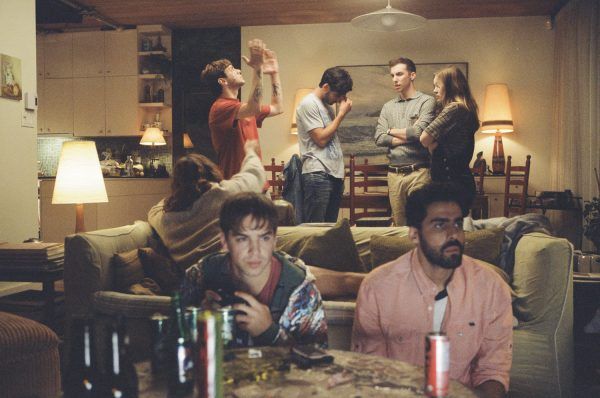As French-Canadian wunderkind Xavier Dolan hits 30, he wants to reflect on his coming of a certain age. In Matthias & Maxime—which screened as part of the 2019 Cannes Film Festival—he has assembled a group of friends as they make a short film. When his character Max is required to kiss his best friend they realise their long suppressed feelings for each other. Max is, however, about to embark on a two-year trip to Australia and audiences are kept enthralled as to whether he might stay and pursue the relationship. It’s a very romantic story and as usual a very personal one.
Dolan not only writes, directs and stars in the film, he edits and is the producer as well. Though it’s not as if his filmmaking efforts have aged him at all. The accomplished filmmaker who has been making high profile movies for a decade (he won the Cannes Jury prize for Mommy in 2014 and several Cannes prizes for 2009’s I Killed My Mother) still looks 20.
COLLIDER: It’s important as an actor to look after yourself.
XAVIER DOLAN: It’s important for me. I’ve always felt I was too short and it’s always been a huge complex, so I’m thinking at least I want to try to look good. I don't know if it’s important for an actor. Youth is so important to a lot of the people in this world who decide what movies are made of and how movies are made. I guess actors do think about that.
Is acting as important for you as directing? You recently impressed in Joel Edgerton’s Boy Erased.
XAVIER DOLAN: Thank you. Actually I want to act in my 30s, that's what I really want to do. I find it more rewarding and more liberating than directing movies.
Why does your character Max have a birthmark in Matthias & Maxime?
XAVIER DOLAN: It was such a big mark and I thought it would stress the fact that his group of friends really accept him for who he is, as they never mention it. They never look at it except the one time in the film when it happens and it is in my opinion quite cruel. He is so comfortable with that group of young men that he forgets this huge scar on his face.
Usually when someone walks in with a birthmark it’s like they have this baggage and I tried to put myself in his position, thinking it must have been a life of stupid insults and constant scrutiny and attention from people. You have to learn to live through the gaze of other people and that's something that I know. I have lived in the eye of people, grown in the eye of people, for the past ten years. When I had the birthmark I walked down the street in the prep and during the shoot and I suddenly realised how people looked at me. They noticed the mark before they recognised me so there was this sort of double take. I realised that the attention and the indiscretion--the stare--is not so different from the one that I get. People are scared, they find it ugly and then I thought it would make Max more vulnerable. What he has on his face I feel I have inside of me. A mark that's bleeding, a sort of wound. It’s about my insecurities or my fears, which my friends in the past years have made me forget just by their presence.
Is it difficult to direct scenes with so many people talking? It looks very complex.
XAVIER DOLAN: They’re very long scenes to shoot, sometimes over several days. But they’re not complex to act, they’re fun. I love long scenes with a lot of overlapping dialogue. They’re heavily scripted and the actors participate in the writing. We rehearsed and I rewrote and we rehearsed and I rewrote, again and again, until we reached a point where we felt that the dialogue was fluid and naturalistic and real. All the silences of life, all the hesitations of people who talk to each other and don't know what the other person is going to say, might feel real, but I often find them boring or artificial on screen.
Could you talk of the casting in the main group scenes?
XAVIER DOLAN: They are friends of mine in their mid to late 20s. I wanted them to ask themselves these questions of identity and sexuality because I think it is not the same to question who you are, what you like, what you are made of and who you are attracted to in your late 20s as opposed to your early 20s. In your early 20s you are exploring and finding yourself and by your late 20s you know yourself better. So when something like that [strong gay attraction] happens it’s very discombobulating. You can feel lost and they are lost.
You've made a small French-language movie after a very big English-language movie, The Death and Life of John F. Donovan, which did not go down well at the Toronto Film Festival.
XAVIER DOLAN: This movie is not in response to another one. It’s just a story I wanted to tell. I started writing it when I was shooting Boy Erased in Atlanta in 2017, a year before John F. Donovan was competed and premiered in TIFF. A lot of people think that I wanted to go back home, but I never left home. I always stick with the people with whom I want to create. I create with the actors I love and it was an incredible experience. So Matthias & Maxime is not a film to reconcile myself or to come to terms with something. It was just a desire to shoot with friends, to be with friends and perhaps feel protected. And it’s not so small a budget. We shot in 48 days on 65 mm and it looks small, but it’s not so small.
I wish I could tell you that I did it because I wanted to heal from the deep wounds of a film that had been badly received, but that's happened to me before. I’ve lived with the criticism of people for ten years now and Georgia O’Keeffe once said how she settled it for herself, how criticism and flattery go down the same drain, and that's basically how I feel. I get so many compliments and also so many hateful reviews. A lot of them are understandable; a lot of them are stupid. I spent ten years trying to find myself through the criticism of others and I don't feel that necessity any more. I also want to act and exist in the eyes of other artists and work with other artists. It’s not because I don't want to tell stories any more, but because I find it harder and harder. It takes a lot of time and a lot of energy and I don't want to wake up one day and feel, “Oh, I’ve made 18 films in 15 years and I feel like I’m 60” when I could have instead used that energy and youth trying to create with other artists who inspire me. I’m shooting a film this summer and another one the summer after as an actor.
Why did you want to act in It Chapter 2, which releases in September?
XAVIER DOLAN: I loved the first film very much. It was so entertaining and fun and scary. I met [director] Andy [Muschietti] randomly and said, “I’ll do anything you want, be the door handle, the door knob, the curtain, whatever I can do in this film”. And he called me and said he wanted me to be Adrian Mellon, the character who inspired It. Adrian Mellon is not his real name. He’s based on someone who existed in real life and got beaten to death by a group of young men in Maine in the 80s because he was gay. They took his body and threw him over a bridge and that is what inspired Stephen King to write it. It's a small part and opens the film--I mean it’s supposed to open the film. (Chuckles.) I don't know if it will still be there, but it was an incredible fun experience. It made me realise that I need more of that sort of time in my life when I create for someone else, when I’m at the service of someone else.


